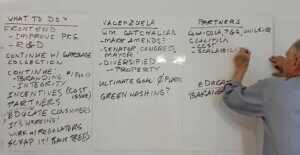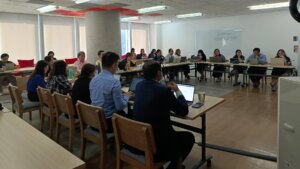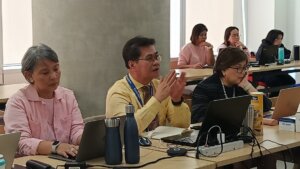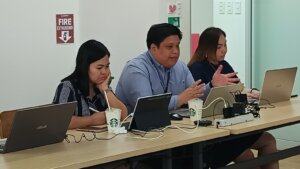Attending the 10th session of JCCI’s Executive MBA on March 26 provided another insightful discussion, focusing on the case study “Going Plastic Neutral: The Nestlé Philippines Experience.” The discussion highlighted the Philippines as a major contributor to plastic pollution, with the Pasig River identified as the most polluted river globally. Nestlé Philippines—the company’s third-largest market worldwide in terms of revenue and first in sales per capita—generates 26,000 metric tons of plastic waste annually. In response, Chairman and CEO Kais Marzouki set an ambitious goal: to make the company plastic-neutral by 2025 by ensuring all packaging is recyclable or reusable.
Nestlé Philippines’ Initiatives Toward Plastic Neutrality
To address plastic waste, Nestlé Philippines Inc. (NPI) has launched several initiatives:
- May Balik Sa Plastik Project: A city-wide collection program in Valenzuela to recover residual soft plastic waste from residents. The initiative established barangay collection points and incentivized waste collectors and residents to participate. Despite scalability and cost-efficiency challenges, the program successfully diverted 15% of residual waste from landfills and inspired local legislation on plastic waste segregation.
- Partnership with Republic Cement: In collaboration with Republic Cement, NPI co-processes plastic waste as an alternative fuel in cement kilns. This method destroys plastic waste at high temperatures, recovering energy and mineral content for cement production. The partnership targets processing 2,200 metric tons of plastic waste per month.
- Plastic Credit Exchange (PCX): NPI explored collaboration with PCX, a global non-profit offering plastic offset programs. PCX focuses on accelerating the circular economy by offsetting plastic footprints and reducing the flow of plastic waste into landfills and oceans.
- Educational Efforts: NPI developed solid waste management modules for schools and condensed materials for teens and parents, endorsed by the National Solid Waste Management Commission. These efforts aim to drive behavioral change and increase awareness about plastic waste management.
- Advocacy for Extended Producer Responsibility (EPR): NPI actively advocates for legislation implementing EPR schemes, extending manufacturers’ responsibility beyond production to the post-consumption stage of their products’ lifecycles.

These initiatives reflect NPI’s commitment to creating a waste-free future and addressing the environmental challenges posed by plastic waste.
Key Takeaways from Group Activities
After the case discussion, Mr. Tully Moss, our discussion leader, grouped participants into sub-groups for activities. Key takeaways included:
- Sustainability Initiatives for John Clements Consultants Inc.: Recommendations included switching fluorescent lights to LED, launching a tree-planting project in 2025 as part of CSR, incorporating sustainability into onboarding orientation, and forming a sustainability committee for oversight.
- Plastic Waste Management in Other FMCG Companies:
- Unilever: Introduced the “Less Plastic, Better Plastic, No Plastic” strategy, including refill stations for personal care brands.
- Procter & Gamble (P&G): Partnered with Republic Cement for plastic waste co-processing and is a member of the Philippine Alliance for Recycling and Materials Sustainability (PARMS).
- Colgate-Palmolive: Collaborated with Republic Cement to use plastic waste as an alternative fuel in cement manufacturing.
- Coca-Cola: Introduced 100% recycled PET (rPET) bottles for Sprite and Viva in the Philippines and partnered with The Plastic Bank to recover and recycle plastic waste in coastal communities.
- Mondelez: Reduced sachet usage by developing thinner but stronger packaging for snack brands.
The Plastic Gyre: A Global Crisis
- Discussion on the Pacific Ocean’s Plastic Gyre: Covering an estimated 1.6 million square kilometers—five times the size of the Philippines—the gyre severely impacts marine and human life:
- Marine Impact: Plastic ingestion, entanglement (ghost fishing), toxicity, habitat damage, and disruption of marine ecosystems.
- Human Impact: Health risks from microplastics, economic damage, climate change contributions, and navigation hazards for vessels.
Reflection and Call to Action
After examining Nestlé Philippines’ efforts to achieve plastic neutrality, it is evident that tackling plastic waste is a complex but crucial endeavor requiring collaboration, innovation, and commitment from all stakeholders. While initiatives like May Balik Sa Plastik and partnerships with Republic Cement show promising approaches, challenges related to scalability, cost-efficiency, and behavioral change persist. Despite these hurdles, the company’s commitment to sustainability serves as an inspiring example for other corporations.
More broadly, sustainability must be embraced as both a personal and collective responsibility. While achieving zero waste may seem daunting, every small action contributes to the greater goal of a healthier planet. Plastic waste disposal is not just an institutional challenge—it requires individual participation. Segregating waste, reducing single-use plastics, and educating others on sustainable practices all make a difference.
With optimism and determination, even modest efforts can drive meaningful change. This is a call to action—not only to support large-scale initiatives like those of Nestlé Philippines but to ignite the spirit of sustainability within ourselves. Every effort matters, and together, we can make a lasting impact.

Take the Lead in Sustainability
Inspired by Nestlé Philippines’ plastic neutrality journey? Partner with experts such as John Clements Consultants to explore impactful corporate sustainability strategies.
Contact us today to start building a greener future for your organization.







